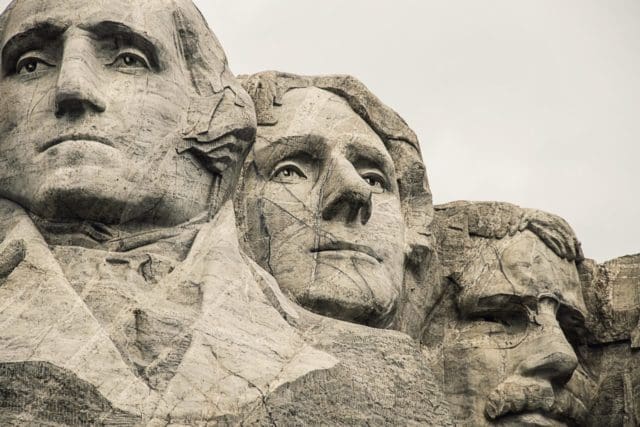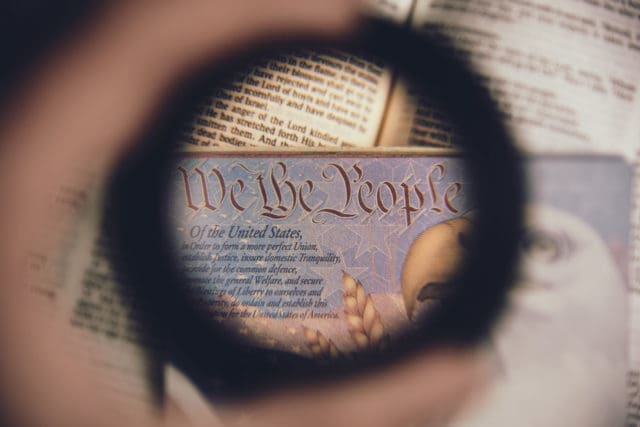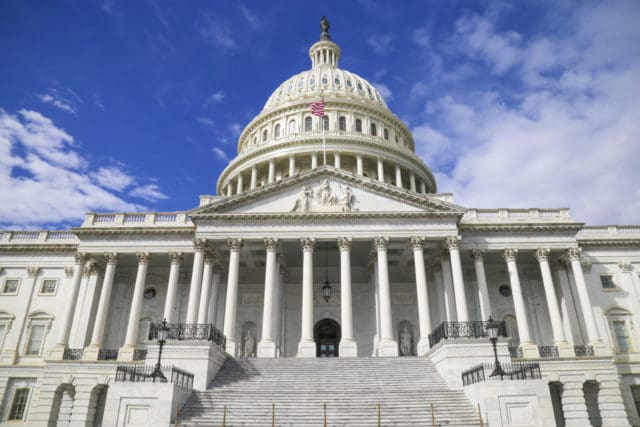 It should be noted that Thomas Jefferson did use the term “Wall of Separation” in a letter to the Dunbury Baptist Association on January 1, 1802. This letter has been widely debated over the years. Here is a quote from that letter. “I contemplate with sovereign reverence that act of the whole American people which declared that their legislature should “make no law respecting an establishment of religion, or prohibiting the free exercise thereof,” thus building a wall of separation between Church & State.” But, he continues, “adhering to this expression of the supreme will of the nation in behalf of the rights of conscience, I shall see with sincere satisfaction the progress of those sentiments which tend to restore to man all his natural rights, convinced he has no natural right in opposition to his social duties.” It should also be noted that this document was written when Thomas Jefferson was the 3rd President of the United States, well after the founding documents were written and ratified. This editorial in the National Archives discusses more on the subject of this letter, “Editorial Note: Reply to the Danbury Baptist Association”
It should be noted that Thomas Jefferson did use the term “Wall of Separation” in a letter to the Dunbury Baptist Association on January 1, 1802. This letter has been widely debated over the years. Here is a quote from that letter. “I contemplate with sovereign reverence that act of the whole American people which declared that their legislature should “make no law respecting an establishment of religion, or prohibiting the free exercise thereof,” thus building a wall of separation between Church & State.” But, he continues, “adhering to this expression of the supreme will of the nation in behalf of the rights of conscience, I shall see with sincere satisfaction the progress of those sentiments which tend to restore to man all his natural rights, convinced he has no natural right in opposition to his social duties.” It should also be noted that this document was written when Thomas Jefferson was the 3rd President of the United States, well after the founding documents were written and ratified. This editorial in the National Archives discusses more on the subject of this letter, “Editorial Note: Reply to the Danbury Baptist Association”
 Lets briefly address the debate of American being or not being a Christian founded country. It was a country that was based on some type of belief in Intelligent Design. For this case, I am going to define Intelligent Design as the belief that something or someone greater then man was instrumental in the creation of the universe. The majority of the Founding Fathers believed in some type of greater power. They did disagree on the form and shape of that power, but if you read their writings, it is clear they did believe that something was greater than them that designed the universe. And by Intelligent Design, I am not talking about any specific religion. It is clear that there were several of the Founding Fathers that did not like the idea of religion, but they did believe in a higher power, how that power was defined was the real debate between them. Being anti organized religion, does not mean that you are anti Intelligent Design.
Now, having said that. The constitution is setup with its bill of rights to protect religious freedom. There is no provision for freedom from religion, but there are provisions for freedom of religion. The logic behind someone thinking they have freedom from religion is flawed at its core for several reason, and goes against everything that the Founding Fathers setup when they created our Constitutional Republic.
Lets briefly address the debate of American being or not being a Christian founded country. It was a country that was based on some type of belief in Intelligent Design. For this case, I am going to define Intelligent Design as the belief that something or someone greater then man was instrumental in the creation of the universe. The majority of the Founding Fathers believed in some type of greater power. They did disagree on the form and shape of that power, but if you read their writings, it is clear they did believe that something was greater than them that designed the universe. And by Intelligent Design, I am not talking about any specific religion. It is clear that there were several of the Founding Fathers that did not like the idea of religion, but they did believe in a higher power, how that power was defined was the real debate between them. Being anti organized religion, does not mean that you are anti Intelligent Design.
Now, having said that. The constitution is setup with its bill of rights to protect religious freedom. There is no provision for freedom from religion, but there are provisions for freedom of religion. The logic behind someone thinking they have freedom from religion is flawed at its core for several reason, and goes against everything that the Founding Fathers setup when they created our Constitutional Republic.
 To believe you have a right to stop a group, or an individual from expressing their beliefs is a gross misunderstanding of the Constitution. The Constitution was based to protect the freedom of speech. It is not to protect you from hearing what others have to say and their beliefs. See the hypocrisy in that thought? You can’t tell one person they can’t share their beliefs, and then allow another person or group to share their beliefs. For example, how can we tell a church they can’t share their beliefs, or petition the government, but allow an organization that is opposed to those beliefs the right to share their beliefs and petition the government. The only difference between a church and an organization is the beliefs of the individuals. If you truly break it down, a church like The Church of Jesus Christ of Latter-Day Saints is not any different than the group PRIDE. They both are a group of like minded individuals that have a belief and a cause that they wish to voice and have protected. If you remove the names, and look at the organizations, you find that they both have the same tax status, they are both the same type of corporation as seen by the State. Why should one be able to discuss politics and the other not allowed to? That would be like saying that my individual beliefs are not allowed to be expressed, but your individual beliefs are. For example, in Utah there are over 14,400 tax exempt organizations or groups. Who decides which organization gets to weigh in and express their political opinion?
The other point that shows this thinking as flawed is thinking that Separation of Church and State means that there cannot be any influence from a church in the laws of the State. This viewpoint is opposed to how the Constitutional Republic works. The citizens get together, they elect a representative. That representative then along with the other representatives enact laws that are supposed to represent the citizens that elected them. Now, if the citizens belong to a church or group, they will try to elect representatives that belong to that church or group because they feel that person would represent their interests. Those representatives will then use those beliefs from their church or group to enact the laws and polices that govern the citizens. See where I am going here? If you have a population that believes one way, and the majority of that population elects someone with those same beliefs, then you will see laws that represent that population. Of course the laws in Utah are different than other states, because the demographic of Utah is different than other states. The churches and groups in any state have a very real influence on the laws in that area. Telling a church, group or individual in that area that they can’t influence the politics in that area is like telling your representatives to not listen to those who elected them, or their own beliefs. And trying to force diversity or a belief in an area bypasses the entire reason for electing representatives.
To believe you have a right to stop a group, or an individual from expressing their beliefs is a gross misunderstanding of the Constitution. The Constitution was based to protect the freedom of speech. It is not to protect you from hearing what others have to say and their beliefs. See the hypocrisy in that thought? You can’t tell one person they can’t share their beliefs, and then allow another person or group to share their beliefs. For example, how can we tell a church they can’t share their beliefs, or petition the government, but allow an organization that is opposed to those beliefs the right to share their beliefs and petition the government. The only difference between a church and an organization is the beliefs of the individuals. If you truly break it down, a church like The Church of Jesus Christ of Latter-Day Saints is not any different than the group PRIDE. They both are a group of like minded individuals that have a belief and a cause that they wish to voice and have protected. If you remove the names, and look at the organizations, you find that they both have the same tax status, they are both the same type of corporation as seen by the State. Why should one be able to discuss politics and the other not allowed to? That would be like saying that my individual beliefs are not allowed to be expressed, but your individual beliefs are. For example, in Utah there are over 14,400 tax exempt organizations or groups. Who decides which organization gets to weigh in and express their political opinion?
The other point that shows this thinking as flawed is thinking that Separation of Church and State means that there cannot be any influence from a church in the laws of the State. This viewpoint is opposed to how the Constitutional Republic works. The citizens get together, they elect a representative. That representative then along with the other representatives enact laws that are supposed to represent the citizens that elected them. Now, if the citizens belong to a church or group, they will try to elect representatives that belong to that church or group because they feel that person would represent their interests. Those representatives will then use those beliefs from their church or group to enact the laws and polices that govern the citizens. See where I am going here? If you have a population that believes one way, and the majority of that population elects someone with those same beliefs, then you will see laws that represent that population. Of course the laws in Utah are different than other states, because the demographic of Utah is different than other states. The churches and groups in any state have a very real influence on the laws in that area. Telling a church, group or individual in that area that they can’t influence the politics in that area is like telling your representatives to not listen to those who elected them, or their own beliefs. And trying to force diversity or a belief in an area bypasses the entire reason for electing representatives.
 When I read people saying that a specific Church, Group, or Organization has no right to discuss political items, I have to roll my eyes. Those who think that a Church can’t discuss politics, but another group can, do not really understand the foundation of the US Government. No one should be silenced, even if you disagree with what they are saying. Everyone and every group has the right to influence the laws and policies of the government that governs them. If you peel away the names, you will see that both a Church, Group and Organization are identical. They are all just a group of like minded individuals that have gotten together, and they all have the right to share their beliefs and influence their governing body.
When I read people saying that a specific Church, Group, or Organization has no right to discuss political items, I have to roll my eyes. Those who think that a Church can’t discuss politics, but another group can, do not really understand the foundation of the US Government. No one should be silenced, even if you disagree with what they are saying. Everyone and every group has the right to influence the laws and policies of the government that governs them. If you peel away the names, you will see that both a Church, Group and Organization are identical. They are all just a group of like minded individuals that have gotten together, and they all have the right to share their beliefs and influence their governing body.
Mike Kieffer is an IT geek by hobby and trade, with a BS in Information Systems & Technology. He is a proud father of 10, a grandpa, an author, a journalist, and internet publisher. His motto is to “Elevate, Inspire and Inform”, and he is politically conservative and a Christian. Mike has a passion for technology, writing, and helping others. With a wealth of experience, he is committed to sharing his knowledge with others to help them reach their full potential. He is known for his jackassery or his form of self-expression that encourages boldness, creativity, and risk-taking. It can be a way to push the boundaries and challenge traditional norms, leading to creative solutions and positive change.
